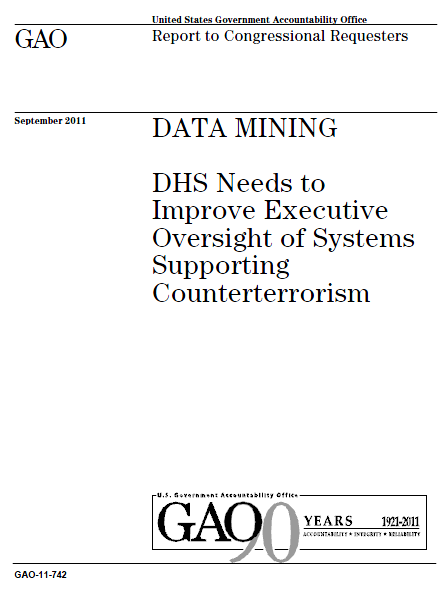DHS Needs to Improve Executive Oversight of Systems Supporting Counterterrorism
- 75 pages
- September 2011
As part of a systematic evaluation framework, agency policies should ensure organizational competence, evaluations of a system’s effectiveness and privacy protections, executive review, and appropriate transparency throughout the system’s life cycle. While DHS and three of its component agencies—U.S. Customs and Border Protection, U.S. Immigration and Customs Enforcement, and the U.S. Citizenship and Immigration Services—have established policies that address most of these key policy elements, the policies are not comprehensive. For example, DHS policies do not fully ensure executive review and transparency, and the component agencies’ policies do not sufficiently require evaluating system effectiveness. DHS’s Chief Information Officer reported that the agency is planning to improve its executive review process by conducting more intensive reviews of IT investments, including the data-mining systems reviewed in this report. Until such reforms are in place, DHS and its component agencies may not be able to ensure that critical data mining systems used in support of counterterrorism are both effective and that they protect personal privacy.
Another aspect of a systematic evaluation framework involves ensuring that agencies implement sound practices for organizational competence, evaluations of a system’s effectiveness and privacy protections, executive review, and appropriate transparency and oversight throughout a system’s life cycle. Evaluations of six data mining systems from a mix of DHS component agencies showed that all six program offices took steps to evaluate their system’s effectiveness and privacy protections. However, none performed all of the key activities associated with an effective evaluation framework. For example, four of the program offices executed most of the activities for evaluating program privacy impacts, but only one program office performed most of the activities related to obtaining executive review and approval. By not consistently performing necessary evaluations and reviews of these systems, DHS and its component agencies risk developing and acquiring systems that do not effectively support their agencies’ missions and do not adequately ensure the protection of privacyrelated information.
DHS faces key challenges in implementing a framework to ensure systems are effective and provide privacy protections. These include reviewing and overseeing systems once they are in operation, stabilizing and implementing acquisition policies throughout the department, and ensuring that privacysensitive systems have timely and up-to-date privacy reviews. The shortfalls GAO noted in agency policies and practices provide insight into these challenges. Until DHS addresses these challenges, it will be limited in its ability to ensure that its systems have been adequately reviewed, are operating as intended, and are appropriately protecting individual privacy and assuring transparency to the public.

